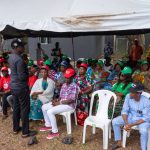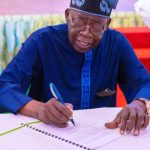Buhari, NIRSAL and Agro-Nigeria: A Success Story
June 30, 2021
The Managing Director/CEO of NIRSAL, Aliyu Abdulhameed, has continued to insist that developing the nation’s agriculture value chain offers the most veritable pathway to achieving genuine socio-economic advancement for Nigeria, rated globally as one of the top countries in the world with a hefty youth bulge

When chroniclers of history take stock of the Nigerian story, President Muhammadu Buhari would most likely be remembered as the best farmer-friendly president. The rice revolution and quantum leap in local production of grains, cotton among others attest to a new era of genuine economic diversification through agriculture.
And it’s all thanks to the Central Bank of Nigeria (CBN) ambitious funding of agriculture and introduction of safety nets to ensure strict compliance with the rules governing loans. One of the chief drivers of the growth in agriculture is the Nigeria Incentive-Based Risk Sharing system for Agricultural Lending (NIRSAL). Quietly and sure-footedly, NIRSAL, launched in 2011 and incorporated in 2013 wholly by the CBN, has thrust Nigeria forward like never before in the entire agro-business value chain.
In a world racked by climate change, insecurity, hunger and poverty, delivering and deepening the agriculture value chain is touted as the most sustainable strategy for achieving food security which will ultimately reduce poverty and ship more people out of the breadline. The World Bank, Food and Agriculture Organisation, FAO, among other relevant bodies have continued to advocate for more people to be mainstreamed into agriculture especially among developing nations. This, they argue can be achieved through structured financing that would reduce loan risks and ensure inclusivity of more players in the value chain.
This is why the Federal Government’s intervention through the instrumentality of NIRSAL is commendable. Founded as a strategic $500 million public-private non-bank financial Institution to boost financial flow and investments into fixed agricultural value chains and incentive-based risk system, it simply mirrors what the World Bank represents to global agriculture. It’s CBN’s tool to de-risk agriculture loans in line with recommendations by global bodies on how to grow agriculture as a counterfoil against poverty and insecurity.
Without food security, a nation has no sovereignty. This is the modern concept of sovereignty, a nation being able to feed her citizens. The Managing Director/CEO of NIRSAL, Aliyu Abdulhameed, has continued to insist that developing the nation’s agriculture value chain offers the most veritable pathway to achieving genuine socio-economic advancement for Nigeria, rated globally as one of the top countries in the world with a hefty youth bulge. Nigeria has a healthy youth population with population of persons between 15 and 64 years standing at over 50 percent. This is not a liability. It’s indeed an asset waiting to be husbanded in a country with an enviable 34 million hectares of arable land.
Abdulhameed bears a burden but he has in recent years shown demonstrable capacity to navigate through the slippery contours of this burdensome challenge chief of which is to continually meet the core mandate of the agricultural lending agency. Established in collaboration with the Federal Ministry of Agriculture and Rural Development and the Nigerian Bankers’ Committee in 2013, NIRSAL was handed a clear mandate which is to stimulate the flow of affordable finance and investments into the agricultural sector by de-risking the agriculture and agribusiness finance value chain, fixing agricultural value chains, building long-term capacity, and institutionalizing incentives for agricultural lending through its five strategic pillars of risk-sharing, insurance, technical assistance, incentives and rating.
Always self-effacing, Abdulhameed cuts the picture of an effective modern day leader: Not wanting to be noticed but allowing his result to speak for him. And yes, he has results to show. Little wonder, he was recently reappointed by President Buhari to oversee Nigeria’s growing agriculture value chain for another five years. An agricultural economist, administrator, risk management expert and chartered manager, Abdulhameed brings to bear his cognate experience and hands-on knowhow honed in both private and public sector. This, no doubt, has helped his pioneering role at the helm as the chief driver of the enterprise which de-risks loans in a sector that has just begun to catch the fancy of more Nigerians.
For his efforts and manifest success at repositioning Nigeria’s agriculture value chain, he was honoured recently with the 2021 Global CEO Excellence Awards by the authoritative international CEO Monthly Magazine. He was among 25 world leaders in risk management, enterprise solution providers, financial experts, entrepreneurs and business leaders chosen from across the world. He shared the honour dais with policy-shapers, thought and business leaders like Kan Shi (China), Sven Daniel Koechler (UAE), Dr. Adullatif Al Shamsi (UAE), Philipp Weisser and Michael Lampel (both from Germany), Ruairi Kelleher (Ireland), among others, including winners from United States and other parts of Europe. The award was not only an honour for him, it was a clear attestation to the fact that there are still bright spots and brilliant sparks in Nigeria’s public sector space which some Nigerians still rate poor in terms of efficiency and work ethics.
The award is another evidence that the Buhari government has moved agriculture forward. It’s a testimony that through the risk-sharing system for agricultural lending, the CBN has stepped out of the rhetoric band of agriculture financing and has moved into the frequency of pragmatism through the Anchor Borrower’s Programme and other instruments. The result is that in a state like Kebbi, for instance, a new community of economic boosters, job creators and emerging millionaires is emerging in the agriculture eco-system made up of farmers, off-takers, processors, produce-distributors to last mile, and sundry value-adders in the entire value chain.
Again, the evidence is that most Nigerian homes now feed on Nigerian-produced rice, millet, beans and other grains. The result shows in the gradual revival of the once-dead textile industry with the supply of cotton from farms across the nation to the textile factories. Even the fiercest critics of the Buhari government cannot deny the reality that this government has been outstanding in deepening agriculture, more than any government since 1999. Facilitating over $550 million to various activities in the agriculture value chain for purposes of mechanisation, input distribution, production, processing and marketing of agriculture commodities, NIRSAL is the cream in the nation’s agriculture cake.
Those who have continued to call out CBN for side-stepping commercial banks in its quest to fund agriculture got it wrong. Federal Reserves all over the world finance agriculture, some directly, some through commercial, microfinance and agriculture financial institutions. The CBN has deployed NIRSAL to good use and has through it set an example of a public-private partnership that works.
Latest statistics from the National Bureau of Statistics, NBS, puts the current unemployment rate in Nigeria at 33.3 percent, the second highest on the global list. But for employment generated through the agriculture value chain, it could have been worse especially with many Nigerians shipped out of jobs last year due to Covid-19 pandemic.
But Nigeria cannot remain tethered to the inglorious stump of unemployment and under-development. With huge expanse of arable land and growing advances in technology, the nation must make the most of the risk-sharing system for agricultural lending. This nation – just like China, US, India – must rally to create billionaires out of farming. The aggregate net worth of the world’s top five richest farmers is in excess of $22 billion. And none of them is from Africa. They are farmers in China (2), US (2) and one from Saudi Arabia. Nigeria ought to be among them. The difference is not in arable land but in financing and technology.
Author: Jackson Udemba writes from Abuja








